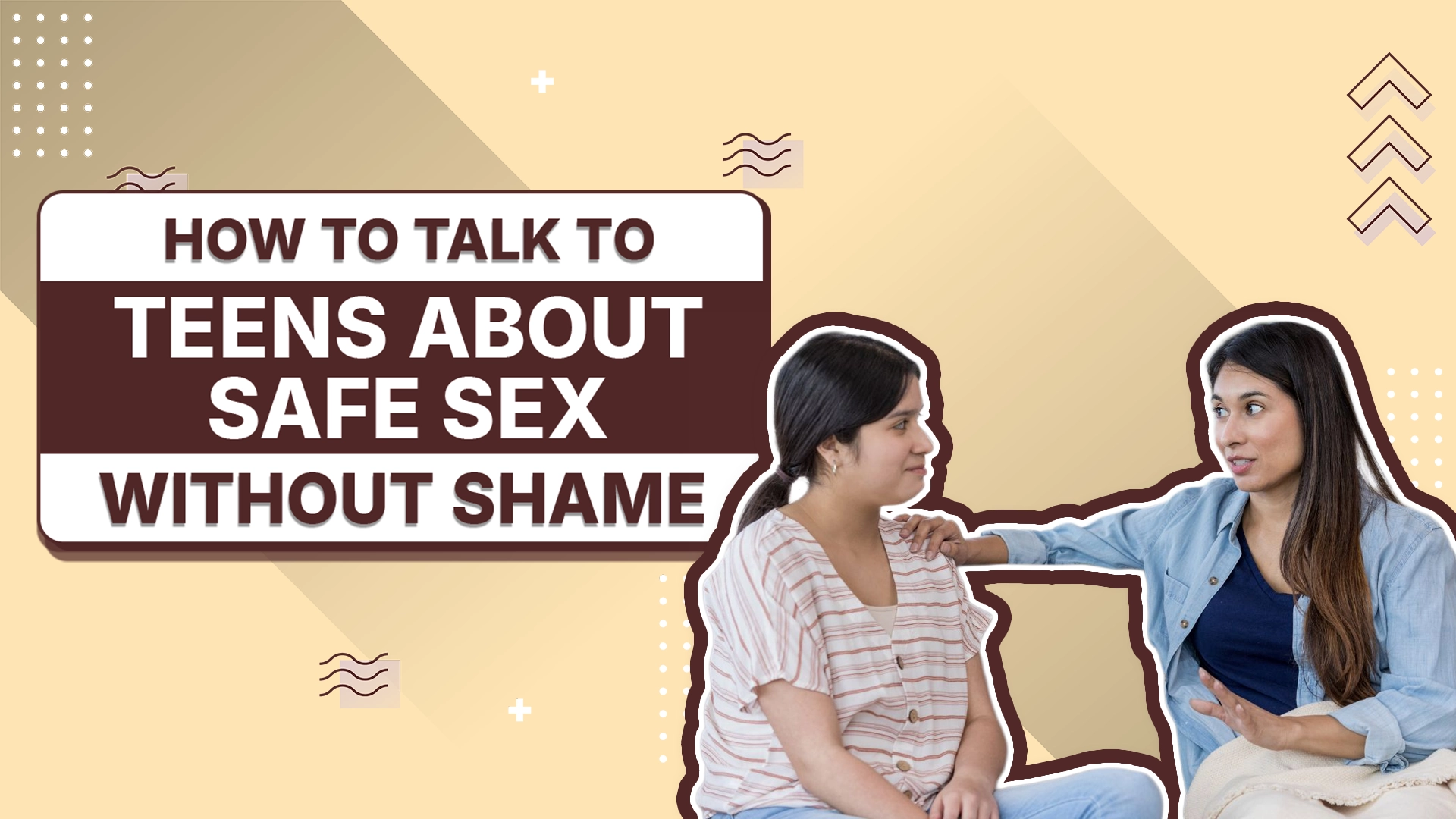Discussing with teens about safe sexual education is one of the most difficult yet most crucial conversations parents and guardians can have.
Many parents are uncomfortable, shy, or unsure about where to begin. But the truth is this: If you don’t discuss sexuality with your teenager about sexuality, then somebody else will. That “someone” could be the internet or friends, which aren’t always trustworthy sources.
Safe sexual education for teens does not aim to encourage teens to have sex. It’s about giving them accurate information, establishing trust, and helping them make informed decisions regarding their body and their relationships.
If we speak freely, honestly, and without shame, adolescents are likely to be safe, make better decisions, and appreciate the value of respect and acceptance.
1. Start the Conversation Early
You don’t need to wait till your teenager is in a relationship to start the conversation. The sooner you start, the more straightforward it becomes. Begin by having conversations about body changes, respect for, and personal boundaries.
For instance:
- If they’re young, they can talk with them about their body and their privacy.
- As they get older, they will be adding issues like puberty, feelings, and relationships.
This can help normalize discussions on safe sexual education for teenagers rather than making it appear to be something that should be considered taboo.

2. Create a Safe and Open Space
Teens are only able to talk when they feel secure and are not being judged. Be careful not to use aggressive words or express anger. Instead, keep the right tone of voice and inform them that it’s fine for them to have questions.
You could say something like:
“You are always welcome to contact me with any questions. I will not criticize you. I’m only trying to ensure that you have the correct facts.”
If teens feel valued and valued, they are more likely to listen and believe your guidance.
3. Be Honest and Use Simple Language
Avoid jargon from medical professionals or complex explanations. Use simple, everyday language to explain concepts such as consent, protection, and the relationship.
For instance:
- As an alternative to “contraception,” say “protection like condoms to prevent pregnancy and diseases.”
- In place of “sexually transmitted infections,” you should say “infections that can spread if people have sex without protection.”
Honesty is the key. Teens will be able to spot when you’re hiding something or refusing to give the truth.
4. Discuss Consent Clearly
One of the crucial elements of secure sexual education for teenagers includes consent. Teens should be aware that:
- “No” always means “no.”
- Consent should be mutually enthusiastic.
- The act of silence or pressure is not the same as giving consent.
Instruct them that observing boundaries — both their own and those of others– is a fundamental and essential part of healthy, responsible relationships.
It is possible to say:
“If one doesn’t agree in a clear manner, it’s not ok to move on. Consent is about respect.”
5. Talk About Emotions, Not Just the Act
Many think that it’s just about birth control or condoms. However, it’s more than this. It’s about discussing emotions and feelings of love, respect, or pressure. Teens must understand that emotional security is as crucial as physical security.
Let them know that it’s okay to take their time, and don’t make them feel pressured to do something to please or fit in with someone.
6. Provide Correct Information About Protection
Teenagers are curious, and if you don’t tell them that they’re curious, they’ll go online, but not everything that they find online is accurate. Make sure they know the truth:
- Condoms can aid in preventing the occurrence of pregnancy and sexually transmitted infections (STIs).
- Birth control patches or pills aid in preventing pregnancy, but do not protect against infections.
- The only abstinence (not having sexual relations) eliminates pregnancy and STIs. However, educating yourself is still vital.
Be aware of how important it is to make sure you are protected at all times..
7. Avoid Shaming or Scaring Them
The use of shame or fear doesn’t aid — it usually makes teens turn away. Instead of telling them, “Don’t do it or you’ll regret it,” consider telling yourself:
“Sex is a major responsibility. You’re welcome to ask concerns and I’ll guide you on how to remain secure.”
Remember that shame is the cause of silence, and silence is a source of risk. A conversation that is respectful and open can lead to an understanding.
8. Respect Their Privacy and Opinions
Teenagers are creating their own identities and their own opinions. Even if you do not agree with them, be quiet and listen to them without interrupting. Then, gently address inaccurate information. However, you shouldn’t cause them to feel embarrassed because they are interested.
Inform them:
“You could hear about a lot of information from friends or even online. If you’re not sure then you should always consult with me.”
This helps build trust and keep communication free.
9. Include Digital Safety Too
In our modern world, safe sex education for teenagers also covers the safety of online communication. Talk about the dangers of sharing private images as well as sexting or conversing with strangers on the internet.
Learn to teach them:
- Never share or publish private images.
- Once an item is live and is available, it cannot be retrieved.
- They should talk to you when they feel uncomfortable on the internet.
Digital respect is a major aspect of the modern educational programs on sex and health.
10. Use Real-Life Examples
Sometimes, the use of examples can help to understand things. It is possible to use stories from TV, movies, or news reports to explore the way people handle relationships as well as consent and decisions.
For instance, if you’re watching a TV show in which the character is subjected to peer pressure, take a moment to ask, “What do you think about that situation?” This allows them to think critically and articulate their opinions.

11. Keep It an Ongoing Conversation
This is not a once-only discussion. Be sure to check back regularly. As your child expands, their concerns will evolve. Keep updating the conversation naturally.
Ask:
“How do you feel about relationships these days?”
“Do you hear your friends talking about safe sex?”
Small talks and informal discussions tend to be more effective than a lecture in its entirety.
12. Be a Role Model
Your actions are more influential than the words you speak. Respect your friends and family members by using polite communications and showing integrity. Teenagers learn the value of respect and a sense of consent from watching their parents and peers.
If they see you as relaxed and open about sensitive subjects, they’ll see that responsibly discussing sexuality is a normal thing, not something to be ashamed of.
13. Seek Professional Help If Needed
If you are feeling uncomfortable or aren’t sure where to begin, it is always possible to seek assistance. Numerous schools, doctors, or counselors offer safe sexual education programs for teenagers. They can help your child or you with appropriate information for your age.
The aim isn’t to achieve perfection, it’s the process. The most important thing is to begin the conversation.
Benefits of Talking About Safe Sex Early
- Develops trust between parents and teenagers.
- Reduces the chance of having an early or uninvolved sexual activity.
- It encourages respect and responsibility.
- Makes teens feel confident about their choices.
- Helps to dispel myths and misinformation regarding sex.
If you discuss sex with no shame, not advocating it. You’re instead promoting respect, safety, and a sense of.
Conclusion
Discussion about safe sexual education for teenagers shouldn’t be awkward or uncomfortable. If you approach the subject with respect, honesty, and candor, it’s an act of love.
Your teenager will feel more respected, confident, and educated. Keep in mind that your goal isn’t to dictate the choices of your child, but instead to help them make secure, respectful, and responsible choices.
Therefore, begin your conversation today without the fear of shame or guilt but rather with respect and confidence. When you are able to speak freely with your child, you can help them develop into a confident, responsible adult who appreciates them and their peers.
(FAQs)
1. When should I begin talking with my teen about sex safety?
Begin in the early years, when they reach puberty (10-13 years old). Make sure the conversation is age-appropriate, and then build it up as they get older.
2. Will discussing sex not cause my teen to be curious or even want to try it?
But it doesn’t. Research shows that teens who receive secure sexual education actually put off sexual activity and make better decisions. Information prevents taking risks.
3. If I’m feeling too embarrassed to discuss it?
It’s totally normal! You can begin small, make use of books or videos to spark conversation. There’s no need to know all the answers, but be willing to listen.
4. What can I do to help my teenager understand consent?
Help them understand that the word “consent” is the agreement of both parties, and that both parties must agree to declare “yes.” Teach them that consent should be as simple as well as honest and not forced.
5. Do I want to let the schools manage sexual education?
Schools play a crucial function; however, your child requires your help. Family conversations can offer emotional encouragement and personal value to what they learn in school.










